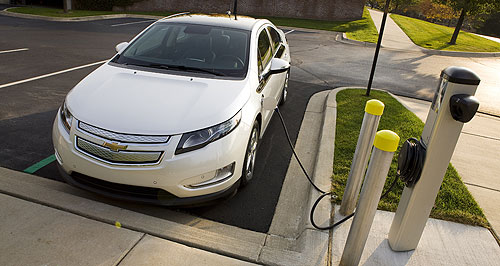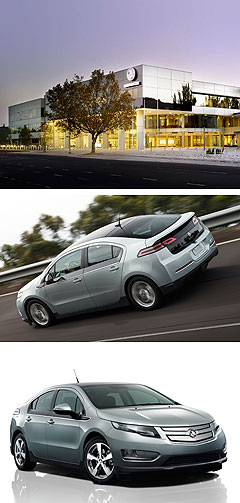Holden Volt on pole position
BY RON HAMMERTON | 23rd Feb 2012

White markings on the concrete pavement in front of the main pedestrian entrance to Holden’s head office in Salmon St, Port Melbourne, stand testimony to the plan to construct a new, dedicated driveway and charging point for Volts owned by both Holden and private buyers.
The work should be completed within a month, adding to a growing number of similar charging points at Holden facilities, including the company’s big Elizabeth factory in South Australia.
Rivals Nissan and Mitsubishi already have public charging points for their full-electric cars, the Mitsubishi i-MiEV and Nissan Leaf, at their respective HQs at Dandenong, Victoria, and Tonsley Park, South Australia.
Although one of the big selling points of the petrol-electric Volt is its lack of ‘range anxiety’ – because once the batteries are exhausted the 1.4-litre petrol engine takes over – Holden is keen to make a statement about the electric capabilities of the Volt.

In the United States where the car went on sale last year, it has become a badge of honour among Volt drivers to see how long they can go without filling the petrol tank, running purely on electric power in their daily driving.
Holden’s fleet of test Volts now in Australia can already be re-charged at other points, including some charging posts installed in Holden’s multi-storey staff car park behind its HQ offices.
The new front-entrance charging point will put the Volt in pride of place so passing drivers and pedestrians can see the cars – including press test vehicles – being charged.
It is unclear if the new charging point will be a simple 15-amp post or posts – which take about three hours to completely charge the Volt’s 16kWh battery from empty – or a high-voltage fast charger, such as the unit installed by Mitsubishi in Adelaide.
Such details are expected to be announced once the facility is operational in the next few weeks.
The Volt that Australia will receive late this year will include all the running changes made to the US-spec Chevrolet vehicle in recent months.
These include greater crash protection for the under-floor battery pack – a change made on the production line after a Volt caught fire in a crash test holding yard three weeks after being subjected to a side pole collision test that ruptured the battery – and lower petrol-mode emissions just introduced so the car can qualify for coveted transit lane access on US freeways.
Holden has yet to provide pricing or exact Australian launch time for the Volt, but has hinted that it could be expected to attract a sticker price similar to that of a moderately optioned BMW 3 Series, which would place it about $60,000.
Late last year, Nissan Australia announced a $51,500 price tag (plus on-road costs) for its all-electric Leaf, while Mitsubishi’s smaller i-MiEV electric city car is $48,800 (plus on-roads).
The Volt has a range of about 60km on electricity, but the petrol engine extends that to about 600km.
The Nissan Leaf has a range of between 70km and 170km, depending on driving conditions and speeds, while the i-MiEV has a range of between 100km and 155km.